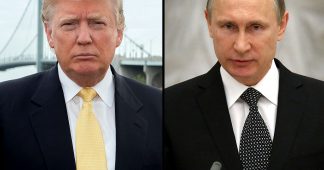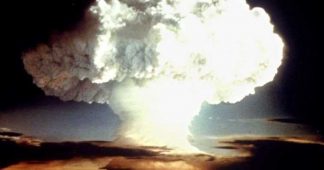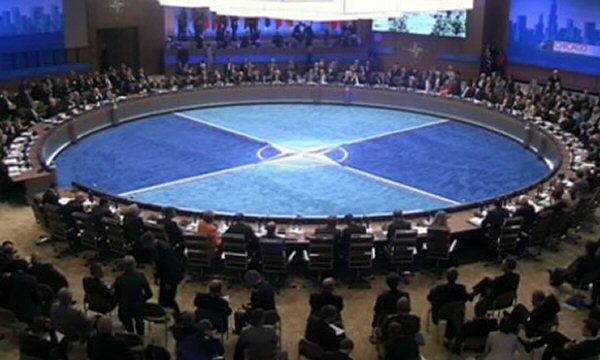‘Words Are Also Deeds’: Unverified Stories and the Growing Risk of War With Russia
The US narratives for which there are as of yet no facts could lead to direct military conflict between Washington and Moscow.
Nation contributing editor Stephen F. Cohen and John Batchelor continue their weekly discussions of the new US-Russia Cold War. (Previous installments, now in their fourth year, are at TheNation.com.)
Cohen argues that the American political-media establishment has embraced two fraught narratives for which there is still no public evidence, only “intel” allegations. One, “Kremlingate,” as it is being called, is that Russian President Putin ordered a hacking of the Democratic National Committee and disseminated e-mails found there to help put Donald Trump in the White House. The other is that Syrian President Assad, Putin’s ally, ordered last week’s chemical-weapons attack on Syrian civilians, including young children. A third faith-based narrative, promoted by MSNBC in particular, is now emerging linking the other two: that Trump’s recent missile attack on a Syrian military air base was actually a Putin-Trump plot to free the new American president from the constraints of “Kremlingate” investigations and enable him to do Putin’s bidding in matters of US national security.
Cohen points out that in addition to the absence of any actual evidence for these allegations, there is no logic. The explanation that Putin “hated Hillary Clinton” for protests that took place in Moscow in 2011 is based on a misrepresentation of that event. And why would Assad resort to the use of chemical weapons, thereby risking all the military, political, and diplomatic gains he has achieved in the past year and half, and considering that he had Russian air power at his disposal as an alternative? And the emerging sub-narrative that Putin lied in 2013, when he and President Obama agreed that Assad would destroy all of his chemical weapons, is based on another factual misrepresentation. It was the United Nations and its special agency that verified the full destruction of those weapons, not Putin. (This allegation is clearly intended to discredit the one important act of US-Russian cooperation, a vital one, in recent years.)
The Russian adage “words are also deeds” is proving true, it seems. Trump’s missile attack on Russia’s ally Syria, despite its ramifying dangers, may have had a domestic political purpose—to debunk the narrative that is crippling his presidency, that he is somehow “Putin’s puppet.” If so, Cohen adds, the American mainstream media, which has promoted this narrative for months, is deeply complicit. Meanwhile, the Kremlin, which watches closely as these narratives unfold politically in Washington, has become deeply alarmed, resorting to its own fraught words. The No. 2 leader, Prime Minister Dmitri Medvedev, declared that US-Russian relations have been “ruined,” a statement Cohen does not recall any previous Soviet or post-Soviet leader ever having made. Medvedev added that the two nuclear superpowers are at “the brink” of war. Considering that Medvedev is regarded as the leading pro-Western figure in Putin’s inner circle, imagine what the other side—state patriots, or nationalists, as they are called—is telling Putin. Still more, the Kremlin is saying that Trump’s missile attack on Syria crossed Russia’s “red lines,” with all the warfare implications that term has in Washington as well. And flatly declaring the mysterious use of chemical weapons in Syria a “provocation,” Putin himself warned that forces in Washington were planning more such “provocations” and military strikes. In short, while the Kremlin does not want and will not start a war with the United States, it is preparing for the possibility.
Cohen and Batchelor ended their broadcast as Trump’s new secretary of state, Rex Tillerson, had just arrived in Moscow, before his talks with Russian leaders began the following day. (Whether or not Putin himself would met with Tillerson, or only Foreign Minister Lavrov, was still uncertain. Putin may be an authoritarian leader, the “decider,” but influential forces in and around the Kremlin were strongly against Putin meeting with an American secretary of state in the immediate aftermath of such a US “provocation.”) Whatever the case, Cohen thinks Tillerson’s visit is vitally important, at least for the Russian leadership, and for Putin in particular.
Tillerson is well known to Putin and other Kremlin leaders. On behalf of ExxonMobil, he negotiated with them one of Russia’s largest energy deals, which would grant access to the nation’s vast oil resources beneath frozen seas. Putin personally approved the deal, which oil giants around the world sought. He would not have done so had he not concluded that Tillerson was a serious, highly competent man. (For this achievement on behalf of a major American corporation, Tillerson too has been slurred as “Putin’s friend” in the American media.) The Kremlin will therefore expect candid answers from Tillerson to these questions related to the looming issue of war or peace. Are the fact-free narratives now prevailing in Washington the determining factor in Trump’s policy toward Russia? Are they the reason Trump committed the “provocation” in Syria? Does this mean that Trump no longer shares, or can support, Russia’s essential strategic premise regarding the civil and proxy war in Syria—that the overthrow of Assad would almost certainly mean ISIS or another terrorist army in Damascus, an outcome that the Kremlin regards as a dire threat to Russia’s own national security? And, most fundamentally, who is making Russia policy in Washington: President Trump or someone else? Putin, it should be recalled, asked the same question publicly about President Obama, when the agreement Putin and Obama negotiated for military cooperation in Syria was sabotaged by the US Department of Defense.
The answers that the very experienced Tillerson—he had his own corporate global state department and intelligence service at ExxonMobil—gives may do much to determine whether or not the new Cold War moves even closer to the “brink” of hot war, certainly in Syria. Meanwhile, the American mainstream media should return to their once professed practice of rigorously fact-checking their narratives with an understanding that words are indeed also deeds.











